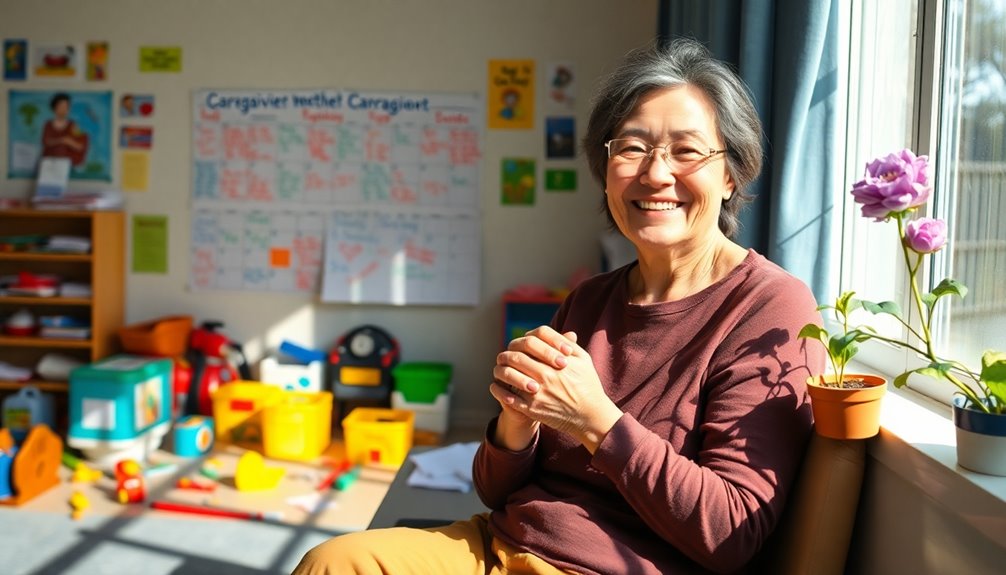You enjoy caregiving because it allows you to make a real difference in people’s lives while building meaningful relationships. By fostering independence and dignity, you empower clients, enhancing their quality of life. You face unique challenges daily that not only develop your problem-solving skills but also bring deep personal fulfillment. The emotional connections you forge provide a sense of belonging and community. Discovering more about the joys and rewards of caregiving can inspire you even further.
Key Takeaways
- I enjoy building meaningful relationships that enrich both my life and the lives of those I care for.
- Caregiving allows me to foster independence and dignity, enhancing the quality of life for my clients.
- I find personal fulfillment and emotional rewards in helping others and tackling unique challenges.
- The role helps me acquire new skills, improving my adaptability and problem-solving abilities in diverse situations.
- Creating deep emotional connections fosters a sense of belonging and community, reducing feelings of loneliness for both myself and my clients.
The Joy of Working With People

While you may start your day with a simple task, the joy of working with people in caregiving goes far beyond the routine. Engaging with clients allows you to build meaningful relationships that enhance their quality of life.
Listening to their life stories not only enriches your experience but also inspires you in unique ways. As you foster trust and comfort, you create a fulfilling work environment that thrives on social connections.
Each interaction with diverse individuals helps you learn and grow, making a huge difference in their lives. This dynamic atmosphere brings job satisfaction and personal fulfillment, reminding you that your role as a caregiver isn’t just a job—it’s a chance to connect deeply with people and positively impact their worlds. Additionally, nurturing these relationships can lead to improved mental clarity and emotional well-being through social connections.
Making a Positive Difference in Lives

As a caregiver, you have the unique opportunity to enhance the quality of life for those you support.
By building meaningful connections, you not only uplift their spirits but also create a sense of belonging that can be life-changing.
Your efforts make a real difference, fostering independence and dignity in their daily lives.
Enhancing Quality of Life
Caregiving greatly enhances quality of life by providing essential support that helps individuals maintain their independence and dignity during challenging times.
By assisting with daily activities, you’re actively helping others navigate their health challenges while fostering a sense of purpose and belonging. Your companionship can considerably reduce feelings of loneliness and depression, leading to better mental health outcomes.
When you help manage medications and encourage treatment adherence, you contribute to improved physical health and lower hospital readmission rates.
The emotional support you offer not only boosts well-being but also creates a community connection that enriches lives. Additionally, understanding the importance of emotional support during transitions can help caregivers provide even more effective assistance to those in need.
Ultimately, your role as a caregiver makes a meaningful difference, enhancing quality of life for those in your care.
Building Meaningful Connections
Building meaningful connections is at the heart of caregiving, making a positive difference in the lives of both caregivers and those they assist. When you engage with elderly people, you create bonds that enhance well-being and reduce feelings of loneliness.
The rewards of caregiving are profound:
- Witnessing the joy on a client’s face as they share their life stories.
- Helping elderly individuals maintain their independence and dignity, allowing them to age gracefully.
- Experiencing personal satisfaction as you see the impact of your support on their emotional health.
These connections not only enrich your life but also provide essential companionship and support, fostering a sense of belonging for those you care for. Additionally, understanding the importance of emotional support can further enhance the quality of the caregiving experience.
Building Meaningful Relationships

In caregiving, you’re not just providing support; you’re building trust and forming bonds that can last a lifetime. Sharing life experiences creates a deep emotional connection, allowing both you and your client to feel understood and valued. This emotional support enriches your relationship, making the caregiving journey more fulfilling for everyone involved. Additionally, incorporating pet therapy in caregiving can enhance emotional well-being, especially for clients with conditions like dementia or Parkinson’s.
Trust and Bonding
Establishing trust and bonding with clients is essential for creating meaningful relationships in caregiving. When you nurture these connections, you foster security and comfort, making a real difference in their lives.
Here are three key benefits of building trust:
- Understanding Needs: You gain deeper insights into your client’s preferences, enhancing the quality of care.
- Emotional Well-Being: Strong bonds reduce feelings of loneliness and isolation for both you and your clients.
- Encouraging Independence: Trust empowers you to motivate clients, boosting their confidence in daily activities.
Shared Life Experiences
While engaging with clients, you often find that sharing life experiences creates a profound connection that enriches both your lives.
These shared life experiences foster trust and open the door to meaningful conversations, allowing you to understand each other on a deeper level. As you exchange stories, you discover common ground, leading to appreciation and respect.
This intimate environment makes it easy to build unique bonds, turning caregiving into something more rewarding. Engaging in activities like cooking or reminiscing strengthens your relationship, creating cherished memories that both of you’ll treasure.
Ultimately, the joy and gratitude you witness in your clients as they share their journeys make the caregiving experience fulfilling and deeply fulfilling.
Emotional Support Connection
Building emotional connections in caregiving goes beyond mere tasks; it’s about creating a safe space where both you and your client can share feelings and experiences. This connection fosters trust and mutual respect, greatly enhancing emotional well-being for both parties.
By providing consistent emotional support, you help alleviate loneliness and support your client’s mental health during challenging times.
Consider the impact of:
- Shared laughter that lightens heavy moments.
- Listening ears that validate emotions and experiences.
- Memorable moments that create lasting bonds.
These elements not only enrich your life but also bring a profound sense of belonging and purpose. Furthermore, understanding the emotional dysregulation associated with Borderline Personality Disorder can enhance your ability to provide effective care and support.
Ultimately, these emotional connections define the essence of caregiving, making it a deeply fulfilling journey for you both.
Fostering Independence and Dignity

Fostering independence and dignity in caregiving is essential for enhancing the quality of life for those you support. By assisting with daily tasks while respecting their choices, you empower them to maintain control over their routines and preferences.
This approach not only helps preserve their dignity but also promotes a sense of self-worth and autonomy. Research shows that caregivers who focus on fostering independence contribute to better mental health outcomes, reducing feelings of helplessness and increasing overall life satisfaction.
When you encourage clients to engage in activities they enjoy, you create a sense of purpose and fulfillment. Ultimately, your efforts in preserving their dignity allow them to age gracefully in a familiar environment, enriching both their lives and yours.
Embracing Unique Challenges Daily

Caregiving isn’t just about maintaining independence and dignity; it’s also about tackling the unique challenges that arise each day.
You’ll encounter situations that require quick thinking and adaptability, making every day unpredictable. Here are three unique challenges you might face:
- Managing medications for people who need precise schedules.
- Providing emotional support when clients feel isolated or anxious.
- Navigating unexpected situations, like sudden health changes, that demand immediate solutions.
Embracing these challenges not only enhances your problem-solving skills but also helps you grow personally. Additionally, understanding the importance of emotional support can significantly improve your caregiving approach.
You’ll learn to celebrate small victories and develop resilience, knowing that your efforts make a real difference in the lives of those you care for.
Gaining Personal Fulfillment

While you navigate the daily demands of caregiving, you’re likely to discover a profound sense of personal fulfillment that comes from making a tangible difference in someone else’s life.
Helping clients improve their well-being offers significant emotional rewards that can uplift your spirit. As you tackle various challenges, you’ll experience a unique sense of accomplishment, enhancing your feelings of competence and purpose.
The emotional bonds you form with those you care for create a rewarding atmosphere, making you feel valued and appreciated. Furthermore, providing companionship not only reduces your clients’ loneliness but also reinforces your own sense of purpose.
Ultimately, this enriching experience fosters personal growth, deepening your connection to the community and enhancing your overall fulfillment.
Learning and Acquiring New Skills

As you experience personal fulfillment in caregiving, you’ll also find countless opportunities to learn and acquire new skills that can benefit both your career and personal life.
Engaging in caregiving roles not only enhances your abilities but also shapes you into a more competent professional caregiver.
Here are three key skills you’ll gain:
- Hands-On Experience: Learn essential practical skills like meal preparation and personal care techniques.
- Communication Skills: Improve your ability to convey information and understand the needs of clients through regular interactions.
- Adaptability: Develop problem-solving skills while maneuvering through diverse health conditions and preferences.
Every moment spent caregiving means learning new skills that pave the way for your growth, both professionally and personally.
Experiencing Emotional Connections

How do emotional connections transform the caregiving experience? When you engage deeply with your clients, you forge bonds that foster mutual trust and affection.
Sharing intimate moments and personal stories allows you to witness and support them through notable life events, enhancing the connection. As these emotional connections develop, you might feel a sense of belonging, almost becoming family to those you care for. This deepening bond encourages open communication and mutual trust, fostering an environment where everyone feels valued. Through shared experiences and laughter, you might even explore themes of family history through classic films, sparking conversations about lineage and memories that bind you together. Ultimately, these connections enrich your understanding of one another, creating a tapestry of shared narratives that reflects love and unity.
The love and commitment you receive in return enrich your emotional well-being, creating a cycle of support. This strong relationship not only provides joy and fulfillment but also greatly reduces feelings of loneliness for both you and your clients.
In caregiving, these connections truly enrich the experience for everyone involved.
Contributing to Community Well-Being

Caregiving greatly contributes to community well-being by providing essential support to vulnerable populations, like the elderly and disabled.
When you engage in caregiving, you’re not just helping individuals; you’re enhancing the entire community.
Here are three impactful ways caregiving makes a difference:
- Reduces hospital readmissions, saving healthcare resources for everyone.
- Mitigates loneliness, leading to improved mental health for both caregivers and those they assist.
- Fosters compassion and support, strengthening social connections within the community.
Additionally, caregiving often involves understanding and managing health risks, such as high sugar levels, which can affect the well-being of those receiving care.
Frequently Asked Questions
Why Do You Enjoy Caregiving?
You enjoy caregiving because it gives you the chance to create meaningful connections with your clients.
Each day brings new challenges and tasks, keeping your work dynamic and engaging.
You feel a deep sense of satisfaction knowing you’re making a real difference in their lives, helping them maintain their independence and dignity.
Sharing stories and experiences enriches your days, allowing you to appreciate diverse backgrounds and fostering a rewarding sense of community.
How to Answer Why Do You Want to Be a Caregiver?
Did you know that nearly 90% of seniors prefer to age in place?
When you consider becoming a caregiver, think about the impact you can have on their lives. You want to support them in maintaining their independence and dignity.
Your empathy and communication skills can foster meaningful connections, while your problem-solving abilities help navigate challenges.
Ultimately, it’s about making a difference and feeling fulfilled by the gratitude and joy you receive in return.
Why Do You Enjoy Being a Carer?
You enjoy being a caregiver because you get to make a real difference in someone’s life every day.
Each moment spent with clients enriches your understanding and perspective, as you learn from their unique experiences.
The deep, trusting relationships you build create a sense of community that’s truly rewarding.
Plus, the variety in your tasks keeps things interesting, challenging you to adapt and grow while witnessing the positive effects of your care.
Why Have You Chosen to Be a Caregiver?
You’ve chosen to be a caregiver because it lets you make a real difference in people’s lives. Each day brings unique challenges and opportunities to connect deeply with those who need support.
You appreciate the variety in tasks and the chance to adapt to individual needs, which keeps your work engaging. Plus, you find fulfillment in contributing positively to your community while continuously growing and learning through each experience.
Conclusion
In the end, caregiving isn’t just about providing support; it’s about embracing the beautiful coincidence of shared moments and connections. You find joy in the laughter exchanged, the stories told, and the small victories celebrated together. Every day, you make a difference in someone’s life while discovering new strengths within yourself. As you foster independence and dignity, you not only uplift others but also enrich your own journey, creating a tapestry of meaningful experiences that bind you to your community.









